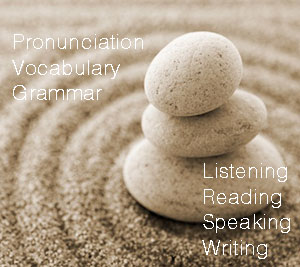 “There are so many unknown words. I just can’t understand the speakers,” I often hear this complaint after my students do their sample IELTS test. If I feel that such student’s vocabulary corresponds to B1-B2 level, I stage a simple experiment. I just ask them to open the page with the listening tapescripts, read aloud and show me all the unknown words. It turns out that in reality they have only three or four such words in the whole Section 1, a bit more for Section 2 and some more unfamiliar words in Section 3. Thus, vocabulary is not the reason for poor understanding.
“There are so many unknown words. I just can’t understand the speakers,” I often hear this complaint after my students do their sample IELTS test. If I feel that such student’s vocabulary corresponds to B1-B2 level, I stage a simple experiment. I just ask them to open the page with the listening tapescripts, read aloud and show me all the unknown words. It turns out that in reality they have only three or four such words in the whole Section 1, a bit more for Section 2 and some more unfamiliar words in Section 3. Thus, vocabulary is not the reason for poor understanding.
What’s the real reason then? That’s their underdeveloped ability to distinguish separate words in the flow of speech and to grasp the gist. Few students had plenty of listening practice in the course of their previous studies, even fewer have a habit of listening to English podcasts, watching English films without subtitles or listening to audiobooks in English.
One more common listening issue is low concentration. The attention wanders as students try to read, write and listen at the same time. Sometimes other thoughts or noises distract, making a learner miss the whole point. When the recording is playing, 80% of attention should be on the recording, and 20% on reading underlined keywords that help the candidate focus on the question. The questions go one by one, so writing is not a problem. It is possible to train the attention as a muscle by constantly returning it to the recording and not letting yourself ponder on your work, family, friends, political situation or any other issue that is not relevant to the listening exercise.
Finally, some students have spelling issues. Again, here only practice can help: spelling dictations, memorising correct spelling and regular revisions. Even people with writing deficiences like dysgraphia can manage, it will just take them more time to get rid of their favourite spelling mistakes.
What are the most efficient listening strategies?
1) Use your timing wisely
At the exam you will be given time to read the questions. Use it to underline keywords in as many questions as you can manage. I recommend to go forward in the listening booklet and find long questions with multiple answers and underline the keywords there. However, as soon as the recording starts, listen to it with 80% of your attention. The rest 20% should be on the next one or two questions. When you are given some extra time “to check your answers”, use it to read forward and underline. Thus, you will manage to read all the questions and underline all the keywords before listening.
2) Predict the answers
If you have “fill in the gaps” questions, you can predict what type of information you will need to hear. It can be a day of the week, time, price, a surname, a phone number, etc. In more difficult sections, you can at least predict the part of speech.
3) Memorise ideas
For matching questions and multiple choice questions you will need to re-read your underlined keywords, trying to memorise the main ideas. Let’s take one task as an example. In this task, you will have five people (Simon, Liz, Sarah, Duncan and Judith) and eight areas of work (advertising, animal care, building, educational links, engine maintenance, food and drink, sales, staffing). Your task is to choose the area of responsibility for each of the five people.
What you need to do is to memorise the eight ideas for areas of work and repeat them in your mind. Then, as you listen, try to catch synonyms for these areas. This way you won’t have to re-read the whole list again and again, losing your concentration on the recording. You will just pick one area that corresponds the best for each person.
4) Catch synonyms
You need to remember the ideas, not the exact words. IELTS is based around synonyms and antonyms, the speakers will never repeat the exact phrase that you have in your listening booklet. Instead of it, they will use synonyms or paraphrase.
5) Move forward
If you failed to hear some answer, just move forward. Don’t think about it till the end of the recording. Then, when you have time to transfer your answers to the answer sheet, you can guess.
6) Don’t leave empty spaces in your answer sheet
You won’t be punished for wrong answers, so even if you don’t know the answer, you can still try to guess.
7) Double check your spelling and question numbers
It’s quite easy to write confuse numbers of questions, especially if you have tables or maps. Just be extra careful when you copy your answers and then double check their numbers. Make sure that your handwriting is clear and reread all your answers again to check the spelling.
Your plan of action how to prepare for IELTS listening:
Do online IELTS preparation course
One of the best courses I came across on the web is IELTS-online. This paid course was compiled by experienced IELTS teachers.
Do IELTS listening twice a week
Use official materials. After doing your listening, transfer your answers to the answer sheets using a pencil, like in a real exam. Finally, check your answers with the answer key.
Develop your vocabulary
After you do the listening, read all the tapescripts and copy all the unfamiliar collocations to your vocabulary file.
Analyse your mistakes
Try to feel the logics of the exam. What was the reason why you made a mistake? Maybe you missed a synonym or didn’t remember the keywords or just didn’t have enough time to hear the answer?
Spend at least one hour daily listening to improve your skill in general
Listen to BBC podcasts every day. Watch films in English without subtitles. Listen to audiobooks. Do Coursera courses. Watch TED presentations. The more varied activities you do regularly, the better.
If you are consistent, these strategies and preparation steps will help you to improve your listening skills in several months.
 Русский
Русский English
English



